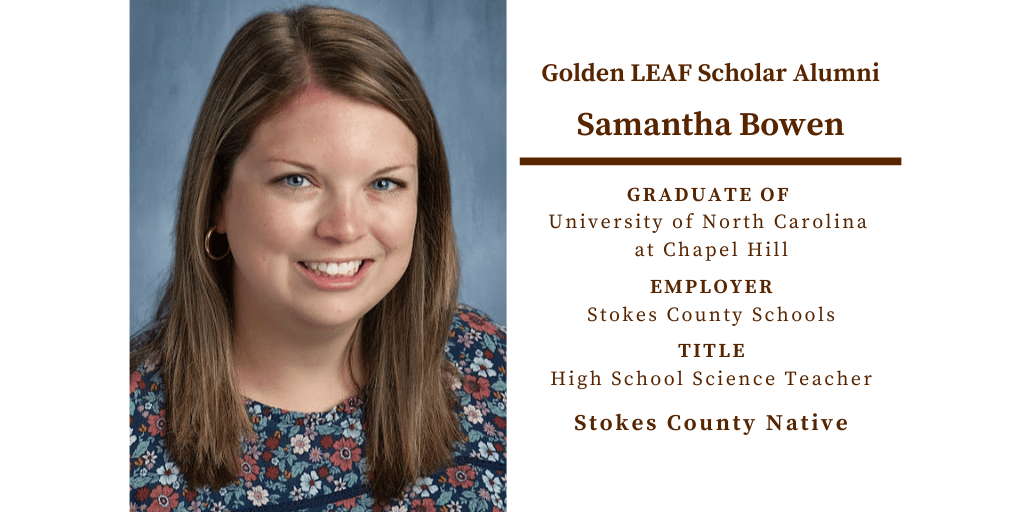Name: Samantha Bowen
Home County: Stokes County
High School Attended: South Stokes High School
College Attended/ Years Attended: UNC-Chapel Hill (2014-2018)
College Major: History
College Minor: Chemistry, Spanish
Current county of residence: Stokes County
Employer: Stokes County Schools
Title: High School Science Teacher
Years working with current employer: 3
What does rural mean to you?
Rural is innovative, collaborative, and resolute. My rural community is beautiful, friendly, and promising. I used to think rural meant a lack of opportunity, but now I know it means rife with opportunities to be created, discovered, and pursued.
What were some of your major accomplishments during college?
In addition to being a Golden LEAF Scholar, my major accomplishments included publishing a research article in my college’s undergraduate journal of history and working as a clinical research assistant in the Emergency Department at UNC Hospital. I was also the first person in my family to graduate from college!
What would you tell someone interested in applying for the Golden LEAF Scholarship about being a recipient?
I would tell them about all of the exciting and rewarding opportunities available through the Golden LEAF Scholarship. I learned so much about myself and my professional goals during my internship experiences. I was also able to make valuable connections with other leaders in my community, which helped me when I was applying for jobs after graduation. The opportunities for professional development offered by the scholarship program in cooperation with the Center for Creative Leadership are unmatched. I apply and reflect on the leadership skills that I developed during the biannual conferences, every day.
What helped you decide to live and work in a rural area?
I probably would not have chosen to live or work in a rural area had it not been for my Golden LEAF internships. My first job out of college was at the UNC School of Medicine in Chapel Hill. While I enjoyed living and working in the Chapel Hill/Durham area, I missed the sense of community that I had felt with my neighbors and coworkers when completing my summer internships in my home county. After about six months in this position, I decided to move back to Stokes County and pursue a career in teaching. I love working in my rural community because of the close relationships that I am able to build with the people I work with and on behalf of.
What kind of leadership roles are you serving in currently?
In addition to being a classroom teacher, I serve as an advisor for several clubs at my school. I am the primary advisor for both the National Honor Society and Students Against Destructive Decisions (SADD) club. I also help with my school’s STEM club and I am the coordinator for the junior marshals. Finally, I am a member of a newly formed organization called Save Stokes, which is aimed at preventing drug use among young people in our county.
What is your hope for rural North Carolina?
My hope is for rural North Carolina to be perceived as a place of opportunity for all North Carolinians, but especially those that grew up there. Many young people feel that they need to leave behind their rural roots and move to an urban area in order to achieve their career goals and be successful. I think this narrative can be changed through persistent leadership, targeted investment, and a strong vision for a brighter future.
What did you learn during your experience?
During my first summer, I interned with the Cooperative Extension office in Stokes County. During my second and third summers, I interned at LifeBrite Community Hospital, which is also located in Stokes. My final internship was five years ago. While I learned many things during my internship experiences, what sticks with me the most after all this time is the importance of collaboration with your colleagues and the community, at large. In rural communities, resources can often be limited and obtaining them can be a complex endeavor. For this reason, many people often have to come together and work together to get things done. I think about what I learned about collaboration and community during my summer internships in my current position as a teacher almost everyday. These skills are extremely relevant to my job and I am thankful to have had the opportunity to develop them through the Golden LEAF program.
Did your experiences help shape your decision to live and work in rural areas? If so, how?
Absolutely! My experiences helped me realize that I value the sense of camaraderie and teamwork that comes with working in a rural community.
Scholar Spotlight



